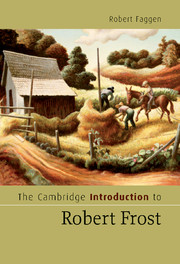3 - Works
Published online by Cambridge University Press: 05 June 2012
Summary
Frost's poetics
Frost's elaboration of his poetics came in the form of relatively short essays and often letters. Unlike Eliot, Pound, and, to some extent, Stevens, Frost deliberately avoided deflecting attention away from his poetry by the enterprise of literary criticism or critical theory. Nevertheless, he left an impressive body of critical prose, and many of his concepts “sound of sense,” “education by metaphor,” poetry as “a momentary stay against confusion,” have come to define not only his own work but also some of the most salient problems of modern poetics. His later essays on poetry are, by most standards, extremely short and published in what would be considered unlikely venues for a world-famous poet intent on having his views brought forth to world. “Education by Poetry,” his richest statement on the nature of metaphor, was a talk given to an Amherst Alumni Association meeting. One of his most important statements on history, nature, and poetic form was a short letter of thanks to the Amherst student newspaper for their salutation on his sixtieth birthday, now known as “Letter to The Amherst Student.” His Norton Lectures on Poetry, delivered at Harvard before audiences of thousands of students and faculty, were never published, and not so much as a draft of them survives.
However Frost's comments – in letters, essays, and interviews – found their ways into the culture and his thoughts on poetics have remained resonant, and not only as interpretive tools for reading his own poetry.
- Type
- Chapter
- Information
- The Cambridge Introduction to Robert Frost , pp. 25 - 161Publisher: Cambridge University PressPrint publication year: 2008

